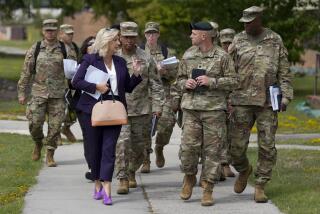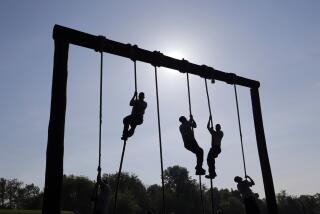High Life / A WEEKLY FORUM FOR HIGH SCHOOL STUDENTS : Plebe Season : 3 Sunny Hills Graduates Bound for Military Academies Face a Summer of Training
FULLERTON — Most teen-agers don’t worry too much about what they’ll be doing next weekend, much less what they’ll be doing in 10 years’ time.
But three recent graduates of Sunny Hills High School are presently preparing for a decade, if not a lifetime, of service in the armed forces.
Errol Glenn left recently for the Merchant Marines Academy in Kings Point, N.Y. Tobin Hobbs heads out Saturday for the U.S. Military Academy at West Point, and Lucas Dabney leaves July 1 for the Naval Academy at Annapolis.
One thing shared among the classmates, despite their different branches of service, is plebe summer--the time freshmen spend at the academies before classes in the fall.
“I’m actually looking forward to plebe summer,” Dabney said. “I’m most nervous about my academic year. I think I’ll handle plebe summer all right, because that’s more me. It’s physical, and you wouldn’t believe the stuff I’ve had to memorize.”
Hobbs’ fears are more general. “I’m most nervous about what I don’t know,” he said. “They inform you pretty well. They give you a pretty good idea of what’s going to happen, but some of the specific things. . . . I like to know everything beforehand.
“They print schedules of what your day will be like, but they leave some things undefined, like training, and it’s like, ‘What exactly am I going to be doing? Am I going to be digging a hole or what?’ ”
For Glenn, the Merchant Marine Academy remains an enigma for which few apparently have much information. “I’m worried about missing something,” he said upon his departure. “There is so much red tape. There are so many medical forms, thousands of them.
“I’m just nervous about the whole situation. I’ve never been there before, which would make it a tad easier. I’m more scared than nervous about how difficult it will be scholastically.”
For Dabney, the decision to attend Annapolis was anything but sudden.
“Since I was (a child), I’ve always wanted to go to an academy,” said Dabney, who, like the other two, did not have a parent who had a military career. “I think my dad told me about it when I was around 5 years old.
“Originally, I wanted to go into the Air Force and be a pilot. Then in the seventh grade, I changed my mind because anybody can land an airplane. I wanted to land an airplane on something that moves , so I wanted to fly in the Navy.”
Dabney’s dream of being a pilot was ended by his poor eyesight. “I noticed my eyes were going bad in the eighth and ninth grades, so the Navy was the best place to go. In the Air Force if you don’t fly, then you’re a second-class citizen. In the Navy I can do anything.”
Glenn also changed his mind about which academy to attend.
“At first I wanted to go to the Naval Academy, but I went to an informal academy night to learn more about it,” he said. “I didn’t know what the Merchant Marines was about, so I listened to them.
“I called the academy to ask for a videotape so I could see what the school was like, and I read some books on it. The more I read, the more I liked it.”
Hobbs’ desire to attend a military academy came later in his life.
“Had you told me even in February of my junior year, I’d have said, ‘No, no, no. . . . I’d never do that. That’s terrible. Who would want to go to a military school?’ Then I got a letter inviting me to a meeting for West Point at Rancho Santiago College. I wasn’t going to go but my dad said, ‘You might as well go and find out about it and see what they have to say.’
“I begrudgingly decided to go. At those meetings they pump it up by telling you about all the good stuff. They don’t lie, they just don’t bring up that you’re going to be running all the time, and it’s hot and terrible.
“I listened to it and thought it was pretty good. I knew that it wasn’t the whole story, but it sounded like something I might do because it’s a good school, the academics are obviously good and they have athletics. Having played basketball in high school, that was something I wanted to keep doing.
“Even when I found out about the bad stuff, the sacrifices seemed pretty small compared to the rewards.”
One of the most attractive advantages of a military academy is the U.S. government pays for your education. However, in return, graduates owe six years of military service. If a student decides to attend graduate school, the government will pick up the tab for that, too, but then more years of active duty are required.
“You want to do this because you want to be an officer,” Dabney said. “You don’t want to do it because it’s a free education, because it’s not a free education. And you don’t do it for anyone else; you have to do it for you.”
The opportunities in the military are many, and assignments are made in order of class rank upon graduation.
“Even after you select a branch, after graduation you have the chance to go to a whole bunch of other schools,” Hobbs said. “You can go to jump school for paratroopers or ranger school, for example. If I had to pick a branch now, I’d pick aviation and fly helicopters.”
Dabney is torn between the sky and the sea.
“I can’t fly, but I could be a navigator,” he said. “But if given the option, I’d prefer to go with the Navy Seals. Something about them intrigues me. They aren’t real cocky, they just get the job done and get out, which is how I am. I’d rather work behind the scenes.”
After Glenn graduates, his choice will be a simple one: work six months on a merchant vessel. “On my off days, I’ll be in the Navy Reserve,” he said. “But I’ll be a civilian, and that’s a big thing with me.”
Dabney said he’s leaning toward a career in the Navy, but is not certain. “I can really see myself as having a career in the military, but other people have told me to wait until I get there and then decide.
“But if I get stuck on a submarine after six years, I’m getting the heck out.”
Said Hobbs, looking into the future: “If the civilian job market is really bad at the time, even if I don’t like the Army that much, I’ll probably stick with it. It’s a secure job.”






